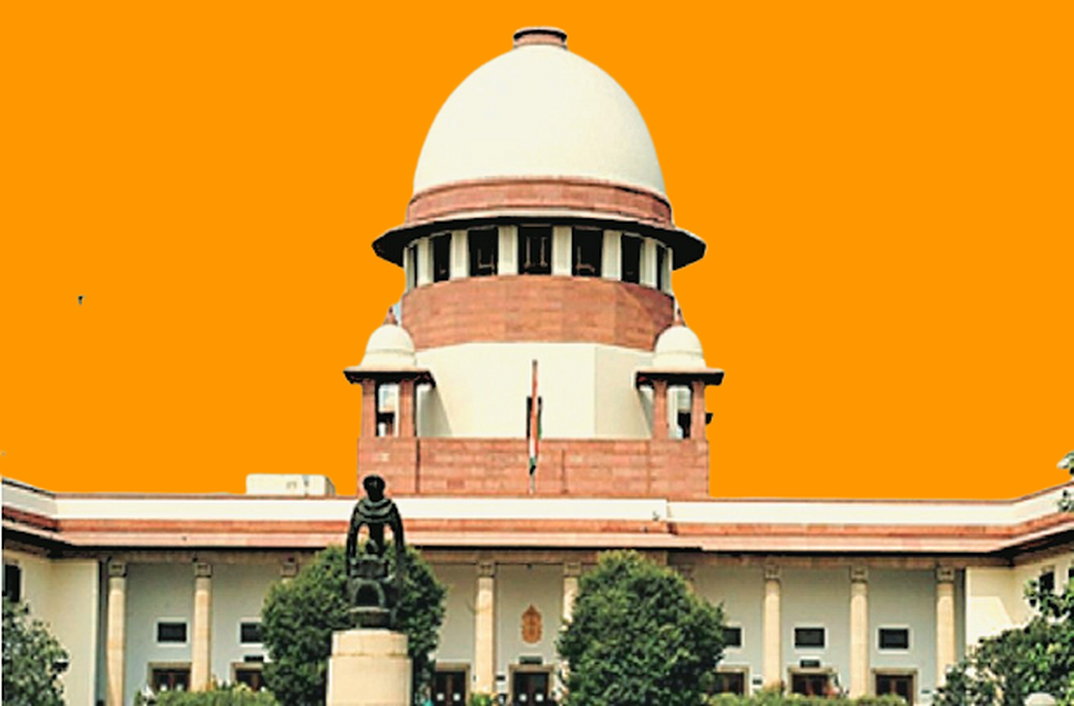Punishment of compulsory retirement prescribed by Rule 27 of CRPF Rules is intra vires the CRPF Act: Top Court confirms punishment imposed on CRPF Head Constable for assaulting his fellow colleague
Chief Justice D.Y. Chandrachud, Justices J.B. Pardiwala & Manoj Misra [08-05-2024]

Read Order:UNION OF INDIA & ORS v. SANTOSH KUMAR TIWARI [SC- CIVIL APPEAL NO.6135 OF 2024]
LE Correspondent
New Delhi, May 15, 2024: The Supreme Court has allowed the Centre’s appeal challenging an order of the Orissa High Court setting aside the punishment of compulsory retirement imposed upon a CRPF Head Constable, who was alleged to have assaulted and abused his fellow colleague. The Top Court held that to keep the Force efficient, weeding out undesirable elements therefrom is essential.
The factual background of the case was such that the respondent (original petitioner) was a Head Constable in Central Reserve Police Force (CRPF) who was charge-sheeted on allegations of assaulting and abusing his fellow colleague.The charge against the respondent was that on 18.06.2005, during Forest Camp Training, he abused M. Devnath, Forest Camp Training Haw/ B.H.M. and assaulted him with a stick. M. Devnath was medically examined. The medical examination report confirmed that he suffered injuries.
In the ensuing enquiry, the charges were found proved against the respondent. As a result thereof, the respondent was compulsorily retired from service vide order dated 16.02.2006. Aggrieved therewith, the respondent filed a departmental appeal, which was dismissed by the Deputy Inspector Genera. The respondent’s Writ Petition before a Single Judge Bench of the Orissa High Court was allowed on the ground that the punishment of compulsory retirement was not one of the punishments specified in Section 11 (1) of the Central Reserve Police Force Act, 1949 (CRPF Act).
The appeal before the Top Court was filed by the Union Of India challenging the judgment of the High Court whereby the Writ Appeal preferred by the appellants against the order of the Single Judge was dismissed. The appellants had contended that the only ground pressed by the original petitioner was that the punishment of compulsory retirement was not imposable as it is not provided for in Section 11 of the CRPF Act and the same was misconceived.
On an overview of the relevant provisions of the CRPF Act and the rules made thereunder, the 3-Judge Bench of Chief Justice D.Y. Chandrachud, Justice J.B. Pardiwala & Justice Manoj Misra opined, “...the Central Government has overall superintendence and control over the Force and the Force is to be administered by the Central Government in accordance with the provisions of the CRPF Act and of any rules made thereunder through such officers as the Central Government may from time to time appoint… Thus, the Central Government is not only empowered to make rules for regulating the award of minor punishment under Section 11 but also to carry out the purposes of the Act which includes superintendence of, and control over, the Force as well as its administration.”
In the case on hand the Central Reserve Police Force Rules, 1955 provide for imposition of the punishment of compulsory retirement though the CRPF Act itself does not provide for it in specific terms. Therefore, the argument on behalf of the respondent was that the CRPF Rules are ultra vires the CRPF Act.
The Bench was of the view that while enacting the CRPF Act the legislative intent was not to declare that only those minor punishments could be imposed as are specified in Section 11 of the CRPF Act. Rather, it was left open for the Central Government to frame rules to carry out the purposes of the Act and the punishments imposable were subject to the rules framed under the Act.
Noting that ‘control’ is a word of wide amplitude and includes disciplinary control, the Bench said, “Therefore, in our view, if the CRPF Act envisages vesting of control over the Force in the Central Government and the various punishments imposable under Section 11 are subject to the rules made under the Act, the Central Government in exercise of its general rule-making power, to ensure full and effective control over the Force, can prescribe punishments other than those specified in that section, including the punishment of compulsory retirement.”
Thus, it was opined that to ensure effective control over the Force, if rules are framed, in exercise of general rule-making power, prescribing the punishment of compulsory retirement, the same cannot be said to be ultra vires Section 11 of the CRPF Act, particularly when sub-section (1) of Section 11 clearly mentions that the power exercisable therein is subject to any rules made under the Act. “We, therefore, hold that the punishment of compulsory retirement prescribed by Rule 27 is intra vires the CRPF Act and is one of the punishments imposable”, it said.
After finding no palpable error in the conduct of the enquiry and noting that the punishment awarded was also not shockingly disproportionate to the proven misconduct, the Bench observed that rather, considering his past service, already a sympathetic view had been taken in the matter and no further latitude needed to be shown to the respondent who was part of a disciplined force and was found guilty of assaulting his colleague.
Consequently, finding no good reason to interfere with the punishment awarded to the respondent, the Bench allowed the appeal.
Sign up for our weekly newsletter to stay up to date on our product, events featured blog, special offer and all of the exciting things that take place here at Legitquest.




Add a Comment